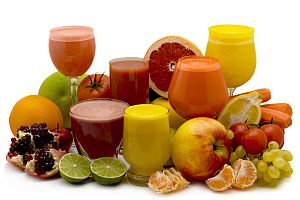A well-functioning digestive system is crucial to maintaining your body’s overall health. Without it, you are likely to have bowel problems and suffer from digestive upsets, not to mention a host of other conditions that can result from not getting enough nutrients from the food you eat. The digestive system affects all the other systems of the body, so it’s important to do what you can to be sure it’s working the way it should. Following are the top 5 things you can do to help improve your digestion.
Eat more fiber – Soluble and insoluble fiber are both essential for moving food through the digestive tract. Soluble fiber, such as that found in oatmeal, beans, nuts and apples, turns to a gel in your intestines and slows digestion, helping to maintain stable blood sugar levels. It absorbs water, softening the stool, and promotes the health of the good bacteria in your gut. Insoluble fiber, such as that found in the skins of fruit and vegetables, speeds digestion, adds bulk and passes primarily intact through the digestive tract. Both are important in preventing constipation and can improve conditions such as irritable bowel syndrome (IBS).
Drink more fluids – Insufficient water intake can harden the stool, increasing constipation. You should be sure to drink at least 1.2 liters of fluid per day, which is about 6 glasses. Some people need more, based on their activity level and the ambient temperature. However, do not drink more than about 6 ounces of liquid during a meal (taking the occasional sip), as it can dilute your stomach acid, making digestion more difficult. Aim to get most of your fluid intake 15-30 minutes before a meal or at least an hour afterward.
Take probiotics – Probiotics such as Lactobacillus and Bifidobacteria are the good bacteria that populate our digestive tract. Eating yogurt with a variety of helpful live cultures as well as fermented foods like sauerkraut, kombucha and kefir can help promote the production and health of these beneficial bacteria.
Eat more fat – Although increasing your fiber intake can improve your digestion that fiber does not move through the digestive tract so easily if you are not getting enough fat in your diet. Good fats will not raise your cholesterol and in fact are a healthy part of your diet when eaten in moderation. Some healthy sources of fat are olive oil, coconut oil, butter and avocados.
Reduce stress – When you are under stress, your digestive system slows down and circulation to the digestive tract is reduced, lowering your body’s ability to efficiently break down and utilize the food you eat. Do not rush through meals, and be sure to sufficiently chew and savor your food when you eat. If you must eat while under stress, be sure you eat foods that are simple to digest, such as broth or yogurt.

